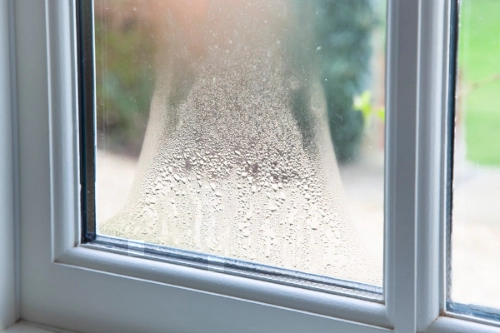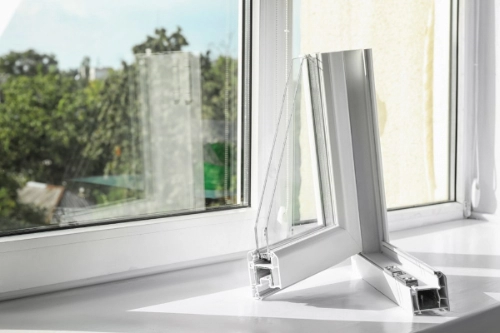
Birds are chirping? and there's fresh dew on the grass. Summer is here and spring cleaning is finished. You walk to your bedroom window to open it and take in the fresh air, only to notice the glass is fogged over. You quickly grab a microfiber towel and wipe the glass, but the condensation isn't on the inside. So you raise the window and wipe the outside? Nothing. Now the frustrating truth begins to sink in. Your windows have a broken seal.
What is a Broken Window Seal?
You might be asking yourself? how did this happen??,? What is a broken window seal??, or even? What is a window seal, in general??. There is no such thing as a fail-proof seal window, thermal or otherwise. If they are properly maintained, wood and aluminum windows have a lifespan of around two decades. Vinyl framed windows can make it 15 years if they have standard box spacers. Most newer vinyl framed windows have a low-quality spacer and these windows begin failing in 5 to 8 years. Sunshine is the biggest cause of window failure, which is why your south and west-facing windows usually fail first. Sunshine causes a process known as solar pumping. and the hardening of the sealant that forms the seals of the window. When sunshine hits a double-pane window, the air inside heats causing the sealed window unit to expand and push air out through the semipermeable seals. In the evening, the window cools and contracts, drawing air and humidity. Day after day, year after year, this cyclical expansion and contraction occurs, stressing the window seals and filling the air space with moisture. In the end, this will lead to cracked window seals that cause failure.

Insulated or double pane glass was developed to save homeowners energy costs. Glass is horrible as an insulator. Insulated glass is simply two panes of glass bonded together with a spacer. The space between the glass is filled with inert gasses like argon, xenon, and krypton. Argon is the most popular gas used because it has a 34% lower thermal conductivity rate than our standard atmosphere. Window manufacturers expect and plan for a lot of abuse. From wind, rain, snow, baseballs, birds, and solar pumping, windows face a lot of different foes.
How Does a Window Seal Get Damaged?
Out of all of the enemies, solar pumping is perhaps the least obvious. Built into every thermal pane window frame is a silica desiccant to absorb the small amounts of moisture inevitably drawn into the window. The desiccant, however, has a limited capacity and lifespan. At some point, the desiccant will have absorbed all the moisture it can hold and that is the day a hazy, misty, bluish fog clouds your glass window pane. From this point on the window begins deteriorating rapidly. If left untreated, the trapped moisture quickly corrodes the inner window glass surfaces, eventually leaving mineral deposits and a permanent white silica haze.
What to do with Window Failure
When windows fog and fail, the only viable option might be a replacement. Even if repair is possible, it is extremely difficult and expensive, and the glass might have been damaged by the minerals in the moist air. The best way to prevent a broken seal is proper maintenance. Every two years the exterior seam where the glass and wood meet should be caulked. Wood frames should receive a fresh coat of paint. But the best way to prevent a broken seal is to purchase a quality window from the start. Make sure the window has a long and comprehensive warranty. If you're unsure whether your windows have broken seals or are just simply dirty, request a free estimate from your local Window Genie. they can assess the condition of your windows and offer guidance.
Related Topic: Discoloration Between Windowpanes (What it Means)
Common Cracked Window Seal FAQs
What causes window seals to break or crack?
Your double-pane or triple-pane windows have window seals that secure the edges of the glass panes. These window seals block moisture and air from getting into your home, and they form a vacuum that contains an inert gas, such as argon or krypton, for maximum insulation. But window seals can wear out over time due to various factors, such as climate, sunlight, humidity, pressure, impact, or aging.
How can I fix a broken or cracked window seal?
Unfortunately, there is no simple or lasting way to fix a broken or cracked window seal by yourself. Some DIY methods may claim to get rid of the condensation or fogging for a bit, such as using a hair dryer, a drill, or a defogging kit, but these methods are not recommended as they can damage your windows further and void your warranty. The only reliable way to fix a broken or cracked window seal is to change the entire glass unit with a new one. You can contact a professional window repair company to do this for you, or you can replace the full window if you want.
How can I prevent my window seals from breaking or cracking in the future?
To prevent your window seals from breaking or cracking in the future, you can follow some simple steps to extend their life and protect them from damage.
- Choose high-quality windows with durable materials and warranties.
- Install your windows properly and securely.
- Clean and maintain your windows regularly.
- Protect your windows from direct sunlight and extreme temperatures. This can be helped with blinds and shades.
- Avoid excessive pressure or impact on your windows.
- Slamming them shut or forcing them open can cause negative wear and tear on the seals.
